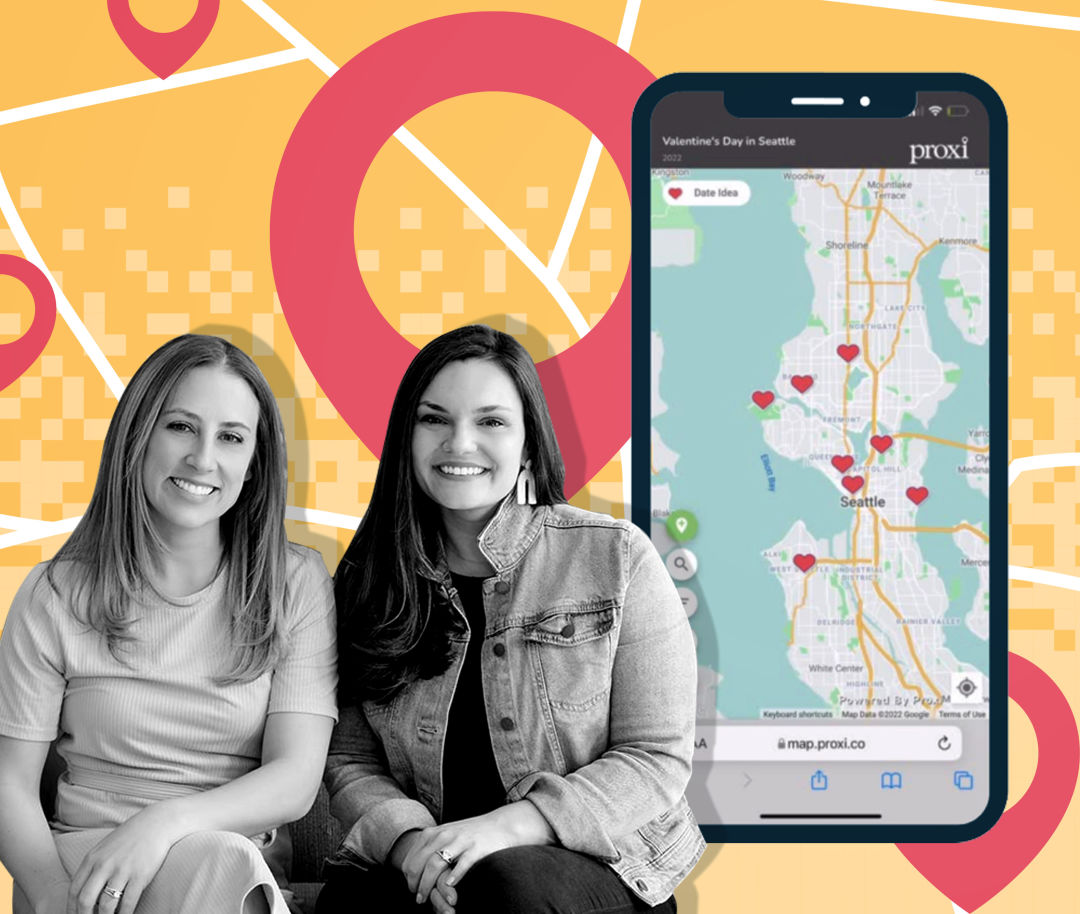Proxi Maps Seattle's Niche Pursuits

Proxi founders Chelsey Roney (left) and Melinda Haughey.
Image: courtesy PROXI, Kaikoro / istockphoto.com, and Seattle Met Composite
This is so dumb, Melinda Haughey thought as she scrolled through the posts in the Facebook group.
In the run up to Halloween in 2020, parents were plotting socially distanced trick-or-treating routes for children by building candy chutes—smart!—and sharing their various locations around Seattle at random in text—not so smart. Even Excel wizards couldn't keep up with such an ad hoc array of locations.
But unlike the many other social media crises presented during the political and public health winter of 2020, Haughey knew there was an easy fix. The Human Centered Design and Engineering PhD candidate at the University of Washington had worked on geospatial tools during her time in the DC intelligence community. In short order, she created and shared a map of all the candy chute locales in her South Seattle neighborhood using Google My Maps. "I was like, if I'm gonna go build one of these things, people better freaking show up to my house."
Turns out others across the city felt the same. Soon the South Seattle Trick-or-Treat Map had to drop the "South" part altogether. About 1,300 Seattle households marked their spots as Haughey's creation went viral. "I like to say that our map sold out Lowe's of PVC pipe in October that year."
The popularity of the trick or treating cartography spawned the idea for Proxi, a startup Haughey launched with Boeing and Microsoft alum Chelsey Roney about a year ago. While Google My Maps allows anyone to generate maps, Haughey and Roney saw a need for more customization. On Proxi, users can brand and design routes—the company refers to itself as the "Canva of maps"—to plot sledding hills, kid-friendly breweries and wineries, and just about any other niche pursuit you can't Google.
After that momentous Halloween in 2020, Haughey received requests through her personal website for all manner of maps. One for a hometown navigating the aftermath of a hurricane. Another for a wedding weekend.
She didn't see much competition out there for map-making tech. Neither did Roney, her longtime friend. They brought the concept to the Techstars Seattle accelerator in 2021 and went full-time last fall. Haughey left her PhD program. Roney sold a business.
Since then, users have fashioned about 3,000-plus maps on the company's platform. Seattle, Denver, and Austin were early focal points, but the hyper-local concept has now gone around the world as people share them via text, email, or QR code. "People like to be known as thought leaders or experts," says Roney.
Businesses, too. The company's raised more than $1.5 million in part because it can, for a price, provide tourism bureaus and other entities data on how people use maps—where they go, if they book reservations through OpenTable. The numbers are in aggregate—nothing creepy, the founders say.
Long-term, Proxi hopes to rival Yelp and Google in recommending local spots, Haughey says. An app would likely be part of that ambitious plan.
For now, the site's Halloween hub will have to suffice for 2022 trick or treating hacks.
Bits and bytes. Barista robots arrive near Pike Place Market. A drone startup delivers seeds to areas scorched by wildfires. Meta violates a campaign ad transparency law in Washington. Seattle's first NFT conference starts today.




